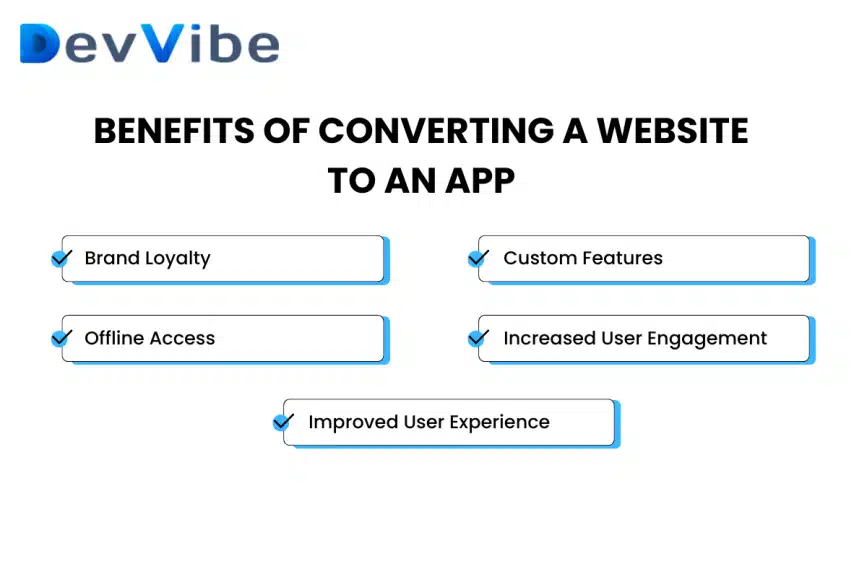
Should You Convert Your Website to an App? Read This First
In today’s fast-paced digital world, businesses are constantly looking for ways to reach their customers more effectively. One big question companies face is whether they should convert their website into a mobile app. With more people using smartphones, apps seem like the next logical step. But is it really necessary? Let’s explore this decision carefully, breaking down the pros, cons, and key factors you should consider before leaping.
Difference: Website vs App
Before we dive in, it’s essential to understand the difference between a website and an app.
- Website: A website is accessed through a browser and works on any device with an internet connection. It’s responsive, meaning it adjusts to different screen sizes.
- App: An app is a software program downloaded and installed on a mobile device (like a phone or tablet). It often provides more interactive experiences and can work even without a constant internet connection.
While websites offer flexibility, apps are designed for a more personalized user experience. This leads to a crucial question: Does your business need an app?
The Benefits of Converting a Website to an App
For good reason, many businesses are shifting from websites to mobile apps. Let’s look at some of the main benefits:
Improved User Experience
Mobile apps are built with user convenience in mind. Since they don’t need a browser, they load faster and offer a smoother, more seamless experience. Apps can take advantage of a phone’s features, such as GPS, push notifications, and camera access, which enhances user engagement.
Increased User Engagement
With apps, businesses have a direct line to their users via push notifications. These can be tailored to gently nudge users to engage with your app, explore new offers, or be reminded of their favorite products. This level of interaction is hard to achieve with just a website.
Offline Access
One key advantage of an app is its ability to offer offline access. While a website requires an internet connection to function, many apps allow users to access certain features without needing to be online. This can be especially useful for content-based apps or e-commerce platforms.
Brand Loyalty
When users download your app, it’s like having a direct link to their phone. They are more likely to interact with your brand regularly. Your logo on a customer’s home screen can boost brand recognition and loyalty.
Custom Features
Apps can offer unique features like loyalty programs, special deals, or personalized content. For example, if you run an e-commerce business, you can create an app that offers tailored product suggestions based on a user’s shopping habits.
The Downsides of Building an App
While apps can offer many benefits, there are some significant drawbacks to consider before making this decision.
Cost
Developing an app is expensive compared to building or maintaining a website. You’ll need to hire developers, designers, and testers, and the costs can add up quickly, especially if you want to support both iOS and Android platforms.
Maintenance
Apps require regular updates to keep up with the latest mobile operating systems. Unlike websites that can be updated on the server, each user will need to download app updates on their device. This means ongoing maintenance costs and potential headaches if users face issues.
App Store Competition
Even if you develop an amazing app, getting it noticed in app stores can be challenging. There are millions of apps available, and unless you have a solid marketing plan, your app might get lost in the crowd.
User Preference
Not everyone prefers using apps. Some users might find apps unnecessary, especially if your website is already mobile-friendly and offers a good experience. Some users may not want to clutter their phones with more apps when they can access your business through a browser.
Factors to Consider Before Converting Your Website to an App
Not all businesses need an app, and the decision should depend on your specific needs and customer base. Here are a few key factors to help you decide:
Your Target Audience
Do your customers prefer using mobile devices? If most of your users access your website through their phones, then it might make sense to offer a mobile app. However, if your customers primarily visit your site from desktop computers, an app might not be necessary.
Business Goals
What are you hoping to achieve with an app? Are you looking to increase sales, improve customer engagement, or offer new features that aren’t possible on your website? Make sure your goals are aligned with the potential benefits of an app.
Budget
Can your business afford the costs of application development and ongoing maintenance? Apps require a significant investment, so it’s important to weigh the costs against the expected return.
Functionality
What features can an app offer that your website can’t? If an app can provide significant improvements in functionality, such as push notifications, offline access, or integration with other mobile features, then it might be worth considering.
Competitors
Are your competitors offering apps? If they are, it could give them an edge in customer engagement. However, if your website is performing well and meets your customers’ needs, following the trend might not be necessary.
When to Stick with a Mobile-Friendly Website
In many cases, a mobile-friendly website is more than enough to satisfy your customers’ needs. If your site is already optimized for mobile devices, offers a smooth user experience, and provides all the functionality your users need, there may be no reason to build an app.
A responsive website offers flexibility across all devices, meaning you don’t have to worry about compatibility with different mobile platforms or the hassle of app updates. Maintaining a mobile-friendly website is often more cost-effective than managing an app.
Conclusion
The decision to convert your website to an app isn’t a one-size-fits-all answer. It depends on your business goals, budget, target audience, and the features you want to offer. Apps can provide a personalized, engaging, and efficient user experience, but they also come with significant costs and maintenance requirements.









